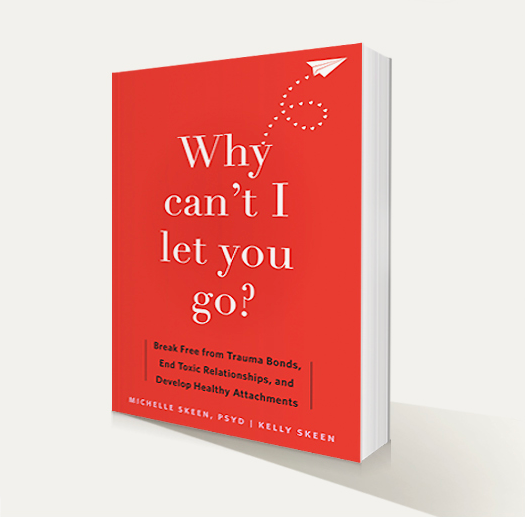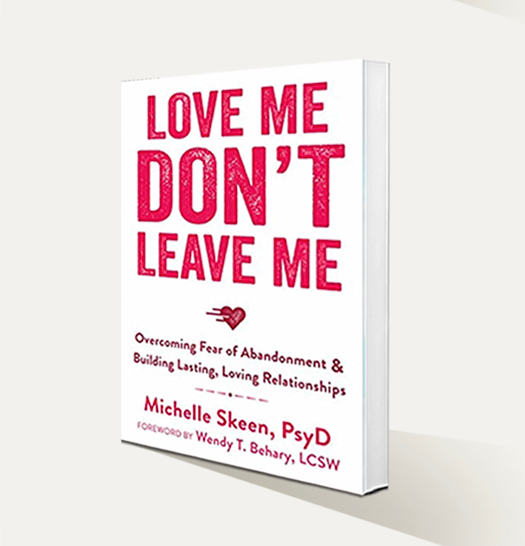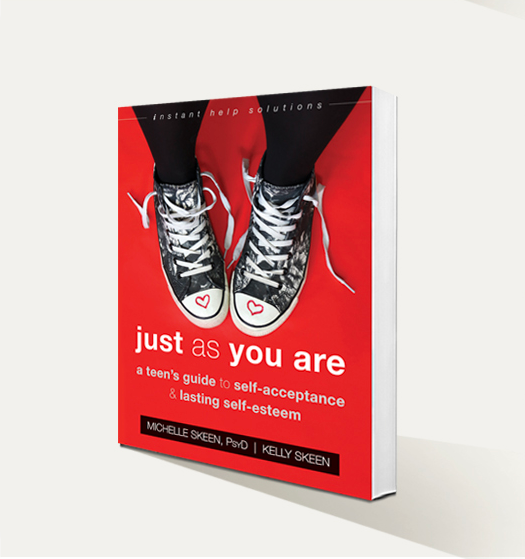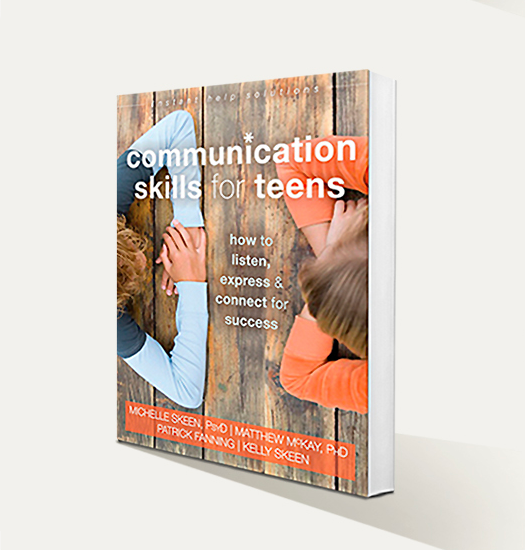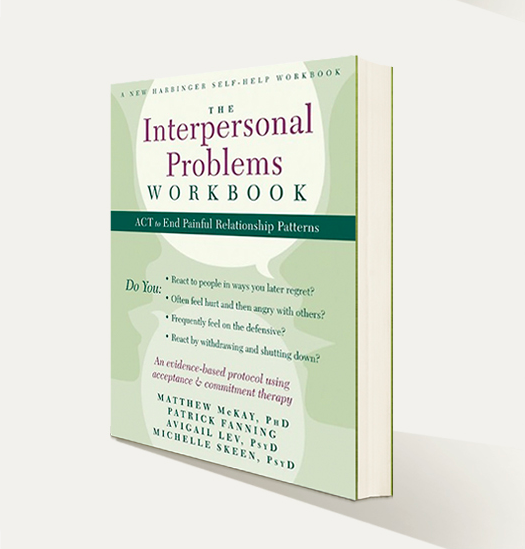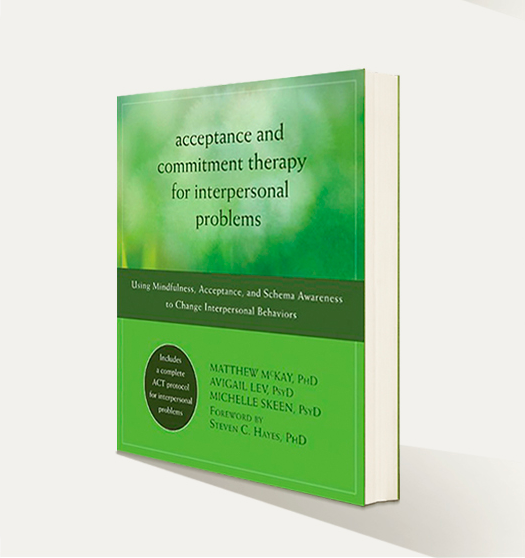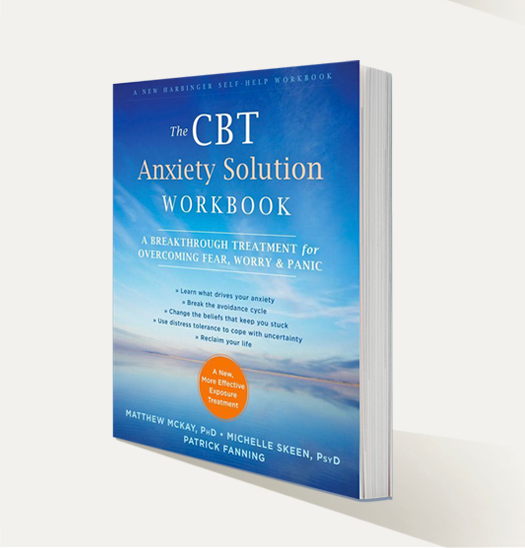My radio show on Thursday November 8, 2018
This week on Relationships 2.0 my guest is Margaret Winslow author of Smart Ass: How a Donkey Challenged Me to Accept His True Nature & Rediscover My Own
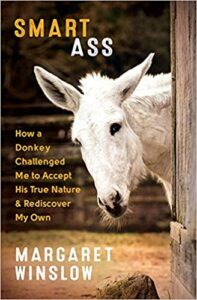 About the book: How do you resolve a midlife crisis? Margaret Winslow, an overworked college professor in New York City, answered a for-sale ad for a “Large White Saddle Donkey.” Hilarity ensued, along with life-threatening injuries and spirit-enriching insight. Walk with Winslow and Caleb the donkey through training traumas, expert-baffling antics, and humiliating races, and share in Winslow’s gradual understanding of Caleb’s true, undeniable gifts: a willingness to be true to himself no matter the circumstances, to trust, and to forgive. As she and Caleb learn to thrive, you’ll learn the importance of being true to your own pure and powerful self.
About the book: How do you resolve a midlife crisis? Margaret Winslow, an overworked college professor in New York City, answered a for-sale ad for a “Large White Saddle Donkey.” Hilarity ensued, along with life-threatening injuries and spirit-enriching insight. Walk with Winslow and Caleb the donkey through training traumas, expert-baffling antics, and humiliating races, and share in Winslow’s gradual understanding of Caleb’s true, undeniable gifts: a willingness to be true to himself no matter the circumstances, to trust, and to forgive. As she and Caleb learn to thrive, you’ll learn the importance of being true to your own pure and powerful self.
About the author: In addition to an unwitting wrangler of a rambunctious donkey named Caleb, Margaret Winslow is a field geologist with over thirty years of wilderness experience in Tierra del Fuego, Patagonia, Antarctica, Alaska, and the Caribbean. Her award-winning travel memoirs have been featured on interviews on NPR’s “West Coast Live,” Bonnie D. Graham’s “Read My Lips” on blogtalkradio, and the Tony Kilgallin Show on NapaTV. She has published over thirty papers in international scientific journals. Her fieldwork on earthquake hazards and archaeological settlement patterns in Alaska and Chile is featured in the PBS series “Fire on the Rim.” She is Professor Emerita of Earth Sciences at the City College of New York. She lives in the lower Hudson valley of New York with her husband, Joe Stennett, a retired oceanographer. Her hobbies include continuing attempts to train her donkey, memoir and mystery writing, singing, and hiking.
Radio show on Thursday November 1, 2018
This week on Relationships 2.0 my guest host is Shawn T. Smith PsyD who interviewed me about my book Love Me Don’t Leave Me: Overcoming the Fear of Abandonment & Building Lasting, Loving Relationships
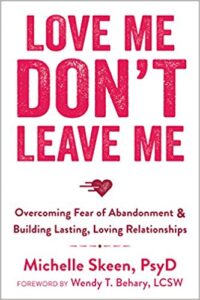 About the book: Everyone thrives on love, comfort, and the safety of family, friends, and community. But if you are denied these basic comforts early in life, whether through a lack of physical affection or emotional bonding, you may develop intense fears of abandonment that can last well into adulthood―fears so powerful that they can actually cause you to push people away. If you suffer from fears of abandonment, you may have underlying feelings of anger, shame, fear, anxiety, depression, and grief. These emotions are intense and painful, and when they surface they can lead to a number of negative behaviors, such as jealousy, clinging, and emotional blackmail. In Love Me, Don’t Leave Me, therapist Michelle Skeen combines acceptance and commitment therapy (ACT), schema therapy, and dialectical behavioral therapy (DBT) to help you identify the root of your fears. In this book you’ll learn how schema coping behaviors―deeply entrenched and automatic behaviors rooted in childhood experiences and fears―can take over and cause you to inadvertently sabotage your relationships. By recognizing these coping behaviors and understanding their cause, you will not only gain powerful insights into your own mind, but also into the minds of those around you. If you are ready to break the self-fulfilling cycle of mistrust, clinginess, and heartbreak and start building lasting, trusting relationships, this book will be your guide.
About the book: Everyone thrives on love, comfort, and the safety of family, friends, and community. But if you are denied these basic comforts early in life, whether through a lack of physical affection or emotional bonding, you may develop intense fears of abandonment that can last well into adulthood―fears so powerful that they can actually cause you to push people away. If you suffer from fears of abandonment, you may have underlying feelings of anger, shame, fear, anxiety, depression, and grief. These emotions are intense and painful, and when they surface they can lead to a number of negative behaviors, such as jealousy, clinging, and emotional blackmail. In Love Me, Don’t Leave Me, therapist Michelle Skeen combines acceptance and commitment therapy (ACT), schema therapy, and dialectical behavioral therapy (DBT) to help you identify the root of your fears. In this book you’ll learn how schema coping behaviors―deeply entrenched and automatic behaviors rooted in childhood experiences and fears―can take over and cause you to inadvertently sabotage your relationships. By recognizing these coping behaviors and understanding their cause, you will not only gain powerful insights into your own mind, but also into the minds of those around you. If you are ready to break the self-fulfilling cycle of mistrust, clinginess, and heartbreak and start building lasting, trusting relationships, this book will be your guide.
About the author: Michelle Skeen, PsyD, has a doctorate in clinical psychology. She is author of seven books, all designed to enhance relationships by emphasizing the importance of identifying core values and valued intentions, limited thinking, mindfulness, self-compassion, empathy, and effective communication and conflict resolution skills. Her passion is coaching individuals in creating and maintaining healthy relationships by bringing awareness to obstacles (fears and beliefs), which often work unconsciously to limit connections with others. Michelle believes that an early introduction and education in core values and healthy communication are essential life skills for success. To that end, Michelle and her daughter, Kelly, coauthored Communication Skills for Teens and Just As You Are. Skeen completed her postdoctoral work at the University of California, San Francisco. She codeveloped an empirically validated protocol for the treatment of interpersonal problems that resulted in two books: Acceptance and Commitment Therapy for Interpersonal Problems and The Interpersonal Problems Workbook. Michelle’s work has appeared in more than thirty publications around the world. She hosts a weekly radio show called Relationships 2.0 with Dr. Michelle Skeen that airs nationally. To find out more, visit her website at www.michelleskeen.com.
Radio show on Thursday October 25, 2018
This week on Relationships 2.0 my guest is Allie Rowbottom author of The Jell-O Girls: A Family History
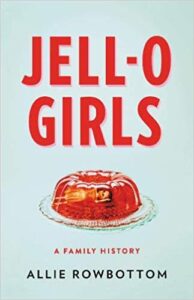
About the book: In 1899, Allie Rowbottom’s great-great-great-uncle bought the patent to Jell-O from its inventor for $450. The sale would turn out to be one of the most profitable business deals in American history, and the generations that followed enjoyed immense privilege – but they were also haunted by suicides, cancer, alcoholism, and mysterious ailments. More than 100 years after that deal was struck, Allie’s mother Mary was diagnosed with the same incurable cancer, a disease that had also claimed her own mother’s life. Determined to combat what she had come to consider the “Jell-O curse” and her looming mortality, Mary began obsessively researching her family’s past, determined to understand the origins of her illness and the impact on her life of Jell-O and the traditional American values the company championed. Before she died in 2015, Mary began to send Allie boxes of her research and notes, in the hope that her daughter might write what she could not. JELL-O GIRLS is the liberation of that story. A gripping examination of the dark side of an iconic American product and a moving portrait of the women who lived in the shadow of its fractured fortune, JELL-O GIRLS is a family history, a feminist history, and a story of motherhood, love and loss. In crystalline prose Rowbottom considers the roots of trauma not only in her own family, but in the American psyche as well, ultimately weaving a story that is deeply personal, as well as deeply connected to the collective female experience. A “gorgeous” (New York Times) memoir that braids the evolution of one of America’s most iconic branding campaigns with the stirring tales of the women who lived behind its facade – told by the inheritor of their stories. A New York Times Editors’ Choice One of People Magazine’s Best Books of Summer An Amazon Best Book of the Month An Indie Next Pick A Real Simple Best Book of 2018
About the author: Allie Rowbottom received her BA from New York University, her MFA from the California Institute of the Arts and her PhD in Creative Writing and Literature from the University of Houston. Her work has received scholarships, essay prizes and honorable mentions from Tin House, Inprint, the Best American Essays series, the Florida Review, The Bellingham Review, the Black Warrior Review, The Southampton Review, and Hunger Mountain. She lives in Los Angeles.
My radio show on Thursday October 18, 2018
This week on Relationships 2.0 my guest is Alexia Vernon author of Step Into Your Moxie: Amplify Your Voice, Visibility, and Influence in the World
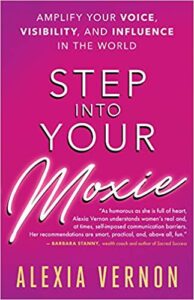 About the book:
About the book:
Step into Your Moxie is a soul-stirring call to action to speak up for yourself and the ideas and issues that matter most to you. Dubbed a “Moxie Maven” by President Obama’s White House Office of Public Engagement for her potent approach to women’s empowerment, Alexia Vernon has helped thousands of women (and men) slay diminishing self-talk and cultivate confidence. She has created a timely, refreshingly playful guide for women to communicate with candor, clarity, compassion, and ease every time they open their mouths to speak — in their careers, communities, and homes. Step into Your Moxie is the book women want by their side as they have that daring conversation, give an important presentation, run for office, or simply tell the people closest to them to step back from the boundaries they’ve trespassed.
About the author:
Alexia Vernon is a sought-after speaking and leadership coach to executives, entrepreneurs, media personalities, and changemakers. The creator of the Spotlight Speakers Collective and Spotlight Speaker Accelerator coaching programs, she has delivered transformational keynotes and corporate training for Fortune 500 companies and professional associations, spoken at the United Nations, and delivered a TEDx talk.
Does Social Media Feed Your Feelings of Unworthiness?
 By Kelly Skeen and Michelle Skeen, PsyD, authors of Just As You Are
By Kelly Skeen and Michelle Skeen, PsyD, authors of Just As You Are
How many times have you looked at your phone today? 10? 20? 30? 40? If you’re an average tween or teen you’ve looked at your phone 46 times. And, you’ve spent a third of your day using media—Instagram, Facebook, online videos, and music. Maybe you do it without thinking.
Have you ever thought about how all of these images are impacting your beliefs about yourself and others? It’s likely that, knowingly or unknowingly, you are comparing yourself to the images you see on your feeds every day. All of us struggle with some aspect of ourselves. This feeling is reinforced and likely made worse by social media and the constant and ever-changing messages you receive about what you need to do, to look like, and to act like in order to be accepted. It can leave you feeling like you need to hide parts of yourself that aren’t perfect and/or don’t fit within the norm. This by itself feels like a setup for failure.
As you might imagine, your beliefs about yourself are a mixed bag. You probably hold some beliefs about yourself that are positive. Maybe you make friends easily, you have great hair, you are close with your siblings, you excel academically, you’re good at sports, and so on. But you also likely have beliefs about yourself that are negative. In fact, this might mean that you are hiding parts of yourself because you fear being judged, not accepted, or both. You may feel that you are outside of the norm in some way. There might even be aspects of your identity that you have no control over or you don’t like—such as your ethnicity, religion, family, culture, height, eye color, body type…you get the point.
Of course, there is even more of your life that is out of your control, because you have parental figures who control parts of your life that you have little or no say about—where you live, what school you attend, activities you are or are not allowed to participate in, who you can be friends with, who you can date—the list goes on. There’s a good chance that you feel inadequate, flawed, or not good enough as a result of some of these factors.
Every teenager (even the ones that seem perfect!) struggles with feelings of inadequacy, defectiveness, and unworthiness. This impacts your feelings of self-worth, which might be holding you back or getting in the way of satisfying peer interactions and acceptance. Like most people, you care what other people think of you, and you probably spend at least some time comparing yourself to your peers. Social media feeds our natural tendency to compare how we measure up to others. This can result in feeling that you are flawed—not as perfect as other people might seem. When these feelings get repeatedly reinforced over time, it can lead to shame, depression, anxiety, and isolation.
We are all wired to connect with others, and when we do make healthy connections, we thrive. So it makes sense that we would want to be accepted by others, and we would fear being found not good enough and rejected. In fact, you may go to great lengths to avoid judgment or rejection from others. This might include seeking affirmation from others, being unable or unwilling to make decisions without approval from others, or having difficulty hearing even mild criticism.
You may find it difficult to accept and share parts of yourself that are out of your control, or you may feel like you need to be a certain way to be liked and accepted by others. Or you may focus more of your energy on others to distract them from the ways in which you feel insufficient. You may already be thinking about the parts of yourself that make you feel less than, or that you hide from others because you fear the response you might receive. And you might even be aware of the ways this holds you back from realizing your full potential or building the relationships that you long for.
The truth is that you don’t have to keep hiding from others or comparing yourself to others. You are beautiful and perfect just as you are.
Lifelong struggles with feelings of unworthiness and inferiority begin with beliefs formed when we’re teenagers. Just As You Are empowers teens to identify and eliminate these beliefs now, before they take root and cause problems like depression, addiction, and failed relationships in adulthood.
https://www.newharbinger.com/blog/does-social-media-feed-your-feelings-unworthiness
My radio show on Thursday July 12, 2018
This week on Relationships 2.0 my guest is Karen Bluth, PhD author of The Self-Compassion Workbook for Teens: Mindfulness & Compassion Skills to Overcome Self-Criticism & Embrace Who You Are
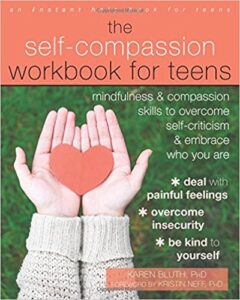 About the book:
About the book:
Your teen years are a time of change, growth, and—all too often—psychological struggle. To make matters worse, you are often your own worst critic. The Self-Compassion Workbook for Teens offers valuable tools based in mindfulness and self-compassion to help you overcome self-judgment and self-criticism, cultivate compassion toward yourself and others, and embrace who you really are.
As a teen, you’re going through major changes—both physically and mentally. These changes can have a dramatic effect on how you perceive, understand, and interpret the world around you, leaving you feeling stressed and anxious. Additionally, you may also find yourself comparing yourself to others—whether its friends, classmates, or celebrities and models. And all of this comparison can leave you feeling like you just aren’t enough. So, how can you move past feelings of stress and insecurity and start living the life you really want?
Written by psychologist Karen Bluth and based on practices adapted from Kristin Neff and Christopher Germer’s Mindful Self-Compassion program, this workbook offers fun and tactile exercises grounded in mindfulness and self-compassion to help you cope more effectively with the ongoing challenges of day-to-day life. You’ll learn how to be present with difficult emotions, and respond to these emotions with greater kindness and self-care. By practicing these activities and meditations, you’ll learn specific tools to help you navigate the emotional ups and downs of the teen years with greater ease.
Life is imperfect—and so are we. But if you’re ready to move past self-criticism and self-judgment and embrace your unique self, this compassionate guide will light the way.
About the author:
Karen Bluth, PhD, earned her doctoral degree in child and family studies at the University of Tennessee. She is currently research faculty in the Program on Integrative Medicine in the Department of Physical Medicine and Rehabilitation at the University of North Carolina School of Medicine. Her work focuses on the roles that mindfulness and self-compassion play in promoting well-being in teens. Bluth was awarded a Francisco J. Varela research award from the Mind and Life Institute in 2012, which allowed her to explore the effects of a mindfulness intervention on adolescents’ well-being through examining stress biomarkers. In spring 2015, she received internal University of North Carolina funding to explore relationships among mindfulness, self-compassion, and emotional well-being in teens in grades 7–12. With current NIH funding, she is part of a research team at the University of North Carolina that is studying the teen adaptation of Kristin Neff and Christopher Germer’s Mindful Self-Compassion program.
In addition to her research, Bluth regularly teaches mindfulness and mindful self-compassion courses to both adults and teens in the Chapel Hill, NC, area and regularly gives talks and leads workshops at schools and universities. In collaboration with Lorraine Hobbs, Bluth has adapted Kristin Neff and Christopher Germer’s Mindful Self-Compassion program for an adolescent population. A former educator with eighteen years classroom experience, Bluth is currently associate editor of the academic journal Mindfulness.
My radio show on Thursday January 18, 2018
This week on Relationships 2.0 my guest is Jeffrey Bernstein, PhD author of Mindfulness for Teen Worry: Quick & Easy Strategies to Let Go of Anxiety, Worry & Stress
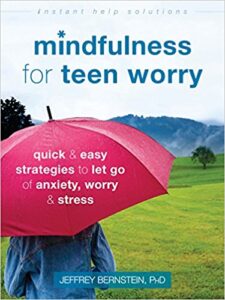 About the book:
About the book:
Is your worrying keeping you from reaching your goals? In Mindfulness for Teen Worry, a clinical psychologist offers quick, easy-to-learn mindfulness skills teens can use anytime, anywhere to stop worries from growing and taking over.
Let’s face it—being a teen isn’t easy. And if you’re like a lot of other teens, you probably worry about getting good grades, fitting in with a certain crowd, or what the future will bring after high school. These are all completely normal worries, and signs that you are tuned in to your life and thinking about your goals. But what about chronic worrying—the kind that keeps you up at night, ruminating about that paper you just turned in, or that thing your friend said to you at lunch (what did she mean by that?), and so on. Sometimes worrying isn’t helpful. In fact, it can get in the way of living your life! So, how can you start putting worry in its place before it takes up too much head space?
Mindfulness for Teen Worry will show you how living in the moment will dissolve worry and help you stay grounded in the here and now. You’ll learn powerful and easy-to-use mindfulness skills to manage the four most common worry struggles teens face: school pressure, coping with friendship and relationship problems, improving body image, and handling family conflicts. You’ll discover why you worry and the long-term destructive impacts worry can have on your life. And most importantly, you’ll be introduced to simple, effective techniques to help you become more mindful—like harnessing the power of the breath and how to relax your body in times of stress.
If you struggle with worry or anxiety that gets in the way of being your best, this fun and friendly guide will help you maintain a mindful life in a frenzied world.
About the author:
Jeffrey Bernstein, PhD, is a psychologist with over thirty years’ experience specializing in child, adolescent, couples, and family therapy. He holds a PhD in counseling psychology from the University at Albany, State University of New York, and completed his postdoctoral internship at the Center for Counseling and Psychological Services at the University of Pennsylvania. He has served as an expert advisor for The Today Show, Court TV, CBS Eyewitness News, NBC 10 – Philadelphia, and appeared on National Public Radio. He has authored five books, including 10 Days to a Less Defiant Child, 10 Days to Less Distracted Child, Liking the Child You Love, Why Can’t You Read My Mind?, and Letting Go of Anger, a card deck for teens.
My radio show on Thursday December 14, 2017
This week on Relationships 2.0 my guest is Linda Kohanov author of The Five Roles of a Master Herder: A Revolutionary Model for Socially Intelligent Leadership
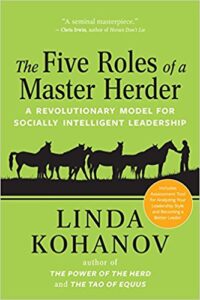 About the book:
About the book:
In The Five Roles of a Master Herder, Linda Kohanov adapts horse-inspired insights into powerful tools for developing collaborative leadership and managing change. Over thousands of years, Kohanov writes, “master herders” of nomadic herding cultures developed a multi-faceted, socially intelligent form of leadership combining the five roles of Dominant, Leader, Sentinel, Nurturer/Companion, and Predator. The fluid interplay of these roles allowed interspecies communities to move across vast landscapes, dealing with predators and changing climates, protecting and nurturing the herd while keeping massive, gregarious, often aggressive animals together — without the benefit of fences and with very little reliance on restraints. She includes an innovative assessment tool to help you determine which roles you currently overemphasize and which roles you may be ignoring — or even actively avoiding. Through this powerful and surprising book, Kohanov will show you how to recognize, cultivate, and utilize all five roles in the modern tribes of your workplace, family, and other social organizations.
About the author:
Through her Eponaquest Worldwide, established to explore the healing potential of working with horses, Linda Kohanov teaches internationally on subjects including leadership, social intelligence, and stress reduction. She lives near Tucson, Arizona.
How to Talk to Anyone
As Seen In
Article related to Communication Skills for Teens:
How to Talk to Anyone
Choices
by Andrea Bartz
click to enlarge:
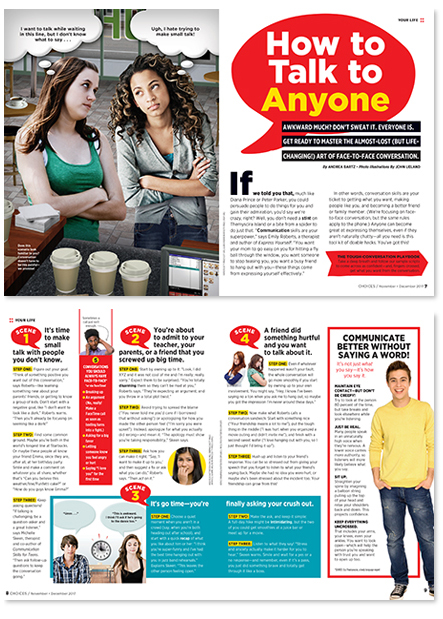
My radio show on Thursday October 5, 2017
This week on Relationships 2.0 my guest is Michael Gelb author of The Art of Connection: Seven Relationship-Building Skills Every Leader Needs Now
 About the book:
About the book:
These days, it’s often easier to avoid face-to-face contact in favor of technological shortcuts. But as Michael Gelb argues in this compelling, entertaining book, the meaningful relationships that come from real interaction are the key to creating innovative ideas and solving our most intractable problems. In The Art of Connection, Gelb offers readers seven methods of developing this essential rapport in their professional and personal lives. Each chapter covers specific techniques and illustrates them with memorable stories, relevant scientific research, and hands-on exercises that allow readers to apply their new skills. Most important, Gelb reminds us that developing rapport with others is not just a business tool to enhance productivity but a valuable end in itself. He guides us to cultivate the skills we all need to deepen our relationships, broaden
About the author:
Michael J. Gelb has pioneered the fields of creative thinking, embodied learning, and innovative leadership. He leads seminars for organizations such as DuPont, Merck, Microsoft, Nike, YPO, and the London Business School. He is the author of fifteen books, including How to Think like Leonardo da Vinci, Brain Power, and Innovate like Edison.
 About the book: How do you resolve a midlife crisis? Margaret Winslow, an overworked college professor in New York City, answered a for-sale ad for a “Large White Saddle Donkey.” Hilarity ensued, along with life-threatening injuries and spirit-enriching insight. Walk with Winslow and Caleb the donkey through training traumas, expert-baffling antics, and humiliating races, and share in Winslow’s gradual understanding of Caleb’s true, undeniable gifts: a willingness to be true to himself no matter the circumstances, to trust, and to forgive. As she and Caleb learn to thrive, you’ll learn the importance of being true to your own pure and powerful self.
About the book: How do you resolve a midlife crisis? Margaret Winslow, an overworked college professor in New York City, answered a for-sale ad for a “Large White Saddle Donkey.” Hilarity ensued, along with life-threatening injuries and spirit-enriching insight. Walk with Winslow and Caleb the donkey through training traumas, expert-baffling antics, and humiliating races, and share in Winslow’s gradual understanding of Caleb’s true, undeniable gifts: a willingness to be true to himself no matter the circumstances, to trust, and to forgive. As she and Caleb learn to thrive, you’ll learn the importance of being true to your own pure and powerful self.










